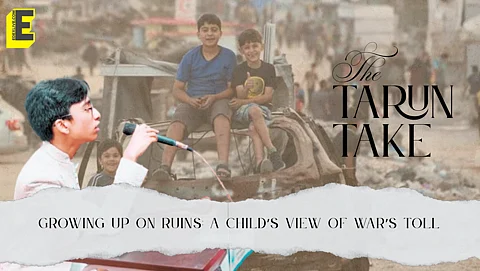

Hey, readers! Sorry for my one-week hiatus. I was taken sick, but I knew I had to write as I saw the bombs on Tehran and Jerusalem.
What I thought of wasn’t about the economies collapsing, or Instagram pseudo-activists posting sympathy posts and making hashtags.
It was the children. Children like me, who have dreams, futures, stories and families. And today, that dream lies barren on the scorched, cratered Earth.
“I no longer set my alarm. The bombs do that for me.” Those are probably the words of countless Palestinians, Iranians and now, Israeli children who live under the iron fist of war.
Every morning, before the sun can rise, their day begins with sirens or the thudding crash of something — someone — lost to the war. The sound shakes their house, or what’s left of it, and they scramble to their feet, ready to run, though they never know where.
School? It’s closed. The shops? They’re shuttered. The streets? They’re quiet, not with peace, but with fear. With the crumbling hope of seeing how the Sun might shine tomorrow.
This is life now, for thousands of kids like me, growing up in places where childhood has been bombed out of existence.
In Tehran, where many once dreamed of becoming engineers, the schools are shut after an Israeli airstrike rattled our city’s fragile calm.
Their books sit gathering dust, and their schoolbag lies under their bed, as useless as their old football. The government ordered closures “until further notice” — but no one can say when that notice will come.
Mothers whisper about food prices rising again, fathers checks the radio for news, and siblings clings when the sirens wail.
“We used to argue over the TV remote. Now we argue over who gets the last piece of bread at dinner,” said an 11-year-old from Gaza on Reddit.
But Iran isn’t alone.
I think about Gaza — a name I learned from headlines and hushed conversations at home. There, kids my age are starving while the world debates aid convoys.
Reports say water is so scarce that children drink salt water or go to bed with thirst gnawing at them harder than hunger ever could.
I read that hundreds of schools are damaged or gone, that half a million children can no longer learn, that classrooms have turned into graveyards in more ways than one.
In Khan Younis, some kids sit on tombstones trying to read what little they have left of textbooks, because even war can’t kill hope completely.
I can’t stop imagining what their mornings must be like. Do they hear the same sirens? Do they dream of quiet? Do they still remember the taste of an apple, the smell of a fresh book? Or is survival all they can afford to think about?
Sometimes, I think about how education is supposed to be our way out. That’s what every adult says. Study hard, and you can be anything.
But what happens when the school gates are locked, the teachers have fled or died, the books have burned, and the only lessons left are the ones war teaches? How to run. How to hide. How to wait for the next explosion.
The hardest part isn’t just losing the lessons—it’s losing the future. My friends and I talk in low voices about what we’ll do “after.” But what is “after”? After the next strike? After the next funeral? After the next ceasefire that lasts a week, or a day, or an hour?
We’ve become good at pretending.
We pretend we’re not scared when the ground shakes.
We pretend they’re not hungry when our parents skip meals so they can eat.
We pretend the world is watching, that it cares.
We pretend that we are not on the brink of nuclear winter.
But mostly, it feels like the world has moved on. We’re just numbers in news reports: the “X killed” or “Y displaced.” We have become variables in the geopolitical column.
No one says our names, no one asks what we wanted to be when we grew up. If we get to grow up at all.
Sometimes, I wonder if kids elsewhere think about them.
If someone in Delhi, or New York, or London, reads the news and wonders what it would feel like to have school canceled not for rain or exams, but because the air isn’t safe to breathe. Because bombs might fall. Because no place is safe.
But I also think about the strength they’ve found.
In Gaza, I heard of kids writing poetry to make sense of loss, joining groups like We Are Not Numbers to tell their stories.
Here, my friends and I draw pictures of the world we want: green fields, quiet streets, schools open and full. I still believe, somehow, that if we don’t give up on that dream, maybe one day, it’ll come true.
What’s hardest to explain is that we don’t want pity.
We want peace. We want a chance.
We want to learn without fear. To play without glancing at the sky for drones.
To sleep without counting sirens. To wake up to sunlight, not rubble.
And maybe, just maybe, if you’re reading this, you can help.
Not with grand gestures—but by remembering. By seeing us as more than headlines. By speaking up when the world’s powerful argue, and we, the smallest, suffer.
By believing that kids anywhere, whether in Gaza or Tehran or your city, deserve more than to grow up in ruins.
So tonight, when the sirens wake me, I’ll try to remember that somewhere, someone read these words and listened. That somewhere, someone cares.
(Tarun Tapan Bhuyan is a student studying in SAI International School. Views expressed are his own.)
